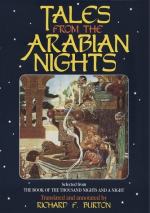[FN#138] The shovel-iron which is the only form of spur.
[FN#139] Used for the dromedary: the baggage-camel is haltered.
[FN#140] Arab. “Harwalah,” the pas gymnastique affected when circumambulating the Ka’abah (Pilgrimage iii. 208).
[FN#141] “This night” would be our “last night”: the Arabs, I repeat, say “night and day,” not “day and night.”
[FN#142] The vulgar belief is that man’s fate is written upon his skull, the sutures being the writing.
[FN#143] Koran ii. 191.
[FN#144] Arab. “Tasbih"=saying, “Subhan’ Allah.” It also means a rosary (Egypt. Sebhah for Subhah) a string of 99 beads divided by a longer item into sets of three and much fingered by the would-appear pious. The professional devotee carries a string of wooden balls the size of pigeons’ eggs.
[FN#145] The pigeon is usually made to say, ’ “Wahhidu Rabba-kumu ’’llazi khalaka-kum, yaghfiru lakum zamba-kum” = “Unify (Assert the Unity of) your Lord who created you; so shall He forgive your sin!” As might be expected this “language” is differently interpreted. Pigeon-superstitions are found in all religions and I have noted (Pilgrimage iii, 218) how the Hindu deity of Destruction- reproduction, the third Person of their Triad, Shiva and his Spouse (or active Energy), are supposed to have dwelt at Meccah under the titles of Kapoteshwara (Pigeon-god) and Kapoteshi (Pigeon-goddess).
[FN#146] I have seen this absolute horror of women amongst the Monks of the Coptic Convents.
[FN#147] After the Day of Doom, when men’s actions are registered, that of mutual retaliation will follow and all creatures (brutes included) will take vengeance on one another.
[FN#148] The Comrades of the Cave, famous in the Middle Ages of Christianity (Gibbon chaps. xxxiii.), is an article of faith with Moslems, being part subject of chapter xviii., the Koranic Surah termed the Cave. These Rip Van Winkle-tales begin with Endymion so famous amongst the Classics and Epimenides of Crete who slept fifty-seven years; and they extend to modern days as La Belle au Bois dormant. The Seven Sleepers are as many youths of Ephesus (six royal councillors and a shepherd, whose names are given on the authority of Ali); and, accompanied by their dog, they fled the persecutions of Dakianus (the Emperor Decius) to a cave near Tarsus in Natolia where they slept for




